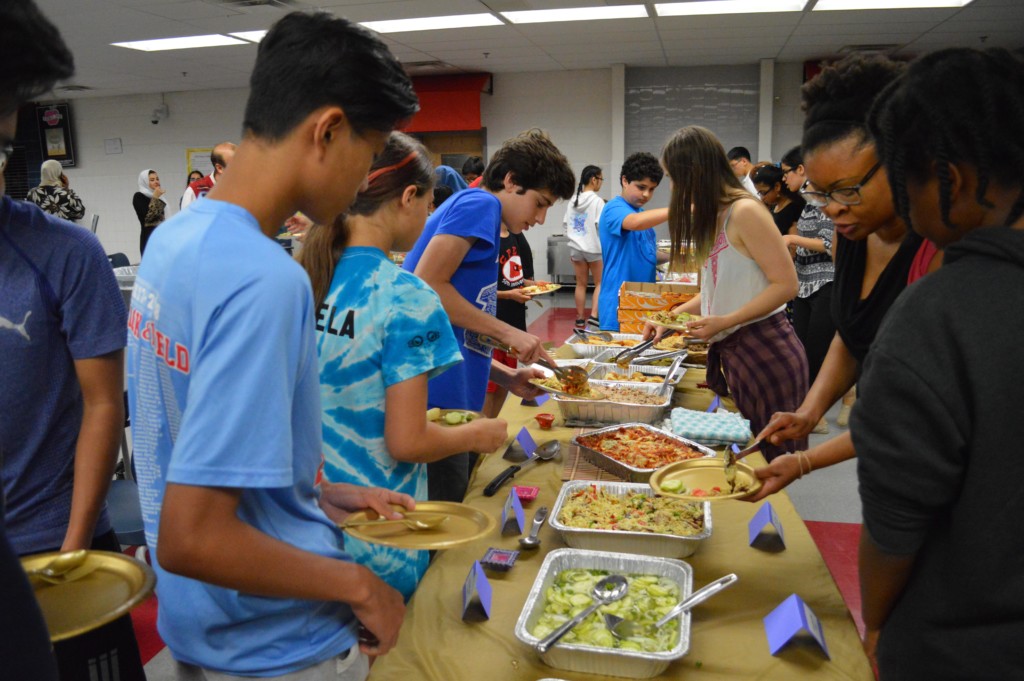Interfaith Club held their first annual Iftar to celebrate Ramadan in the cafeteria on May 17. The term “Iftar” refers to the meal that Muslims consume at sunset to break their daily fast.
“We came up with the idea of an annual Iftar because some people don’t understand Ramadan or don’t even know it exists, so in this way we could bring people together,” sophomore and Interfaith Club President Sophie Konde said.
Interfaith Club worked in collaboration with Muslim Student Association and Indian Subcontinent Association to bring the event together. The event opened with a welcome address by English teacher and Interfaith Club sponsor Chynna Wendell, followed by student-led presentations of the contributing clubs. Each person presented about their respective religion.
“My religion is Judaism, so we celebrate Yom Kippur,” Konde said. “[It] is similar to Ramadan in the sense that we fast for 24 hours to ask for forgiveness for our sins, and say that we are going to be better people in the upcoming year.”
The breaking of the fast took place after the presentations. Wendell invited people to participate in the Call to Prayer, the Islamic prayer that Muslims traditionally recite during the Iftar. Wendell passed around dates to the guests because she said they held religious significance in Islam.
“[Muslims] break the fast with dates because that’s what Prophet Mohammed did,” Wendell said.
Both Muslims and non-Muslims participated in the Call to Prayer, also known as “Salah.”
“The procedure for ‘Salah’ is that you have to make ‘Wudu’, which is the purification of the body,” senior Soliman Salem said. “You cleanse yourself, and all that water that drips off of you represents the sins… Then to start the prayer, you have to say ‘Allahu Akbar’, which means ‘God is [the] greatest’.”
For Muslims, praying five times a day is a religious duty, which is one of the Five Pillars of the faith of Islam.
“You have to be covering yourself and you can’t pray unless you have the intention of praying,” Salem said. “For every set [of prayer], you need to say the ‘Fatiha’, the opener of the Qur’an.”
Salem said that reciting the “Fatiha” legitimizes the prayer.
“If you don’t use the opener, the prayer is null,” Salem said. “[Praying] is all about praising the Lord. There was a part during the prayer when we were bowing… that’s when we make pleas and ask God for forgiveness.”
The organizers of the event received donations from local restaurants, such as Jason’s Deli and Ledo Pizza. Individual members also brought in traditional home-cooked meals and desserts.
“We had Mexican, Malaysian and Sudanese food,” Wendell said. “Usually an Iftar will be fairly segregated by culture and nationalities, so you’ll find traditional dishes from each of them.”
Wendell said she was pleasantly surprised by the high turnout of the Iftar.
“We didn’t expect to have such a high turnout,” Wendell said. “It’s overwhelming to see so many people, and that’s a really good sign for the future.”
Konde said that the amount of organization and planning that went into the event contributed to its high turnout.
“I feel like the way we organized [the Iftar] tonight actually worked, and I’m really happy with how it turned out,” Konde said. “In the upcoming years, we could expand based on students’ contributions.”
At one point during the event, Wendell asked the attendees to write down on a sheet of paper something about their faith that they wished other people knew. Guests also had the opportunity to participate in activities like face-painting.
“I think the best part was just everybody coming together to celebrate, regardless of their religion,” participant Elhan Musca said.
Wendell said this event was not just an opportunity for people to celebrate, but also to be open-minded about various cultures and religions and embrace their differences.
“People fear what they don’t know, and we are more alike than we are different,” Wendell said. “I just want everyone to come together, share and be happy… Hopefully there will be more events like this in the future.”
2018-06-08

